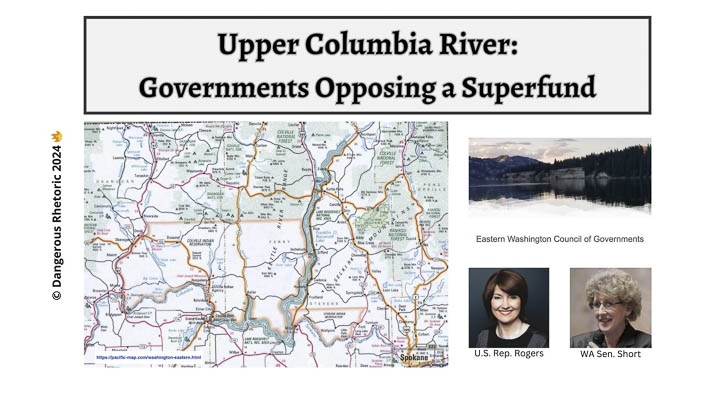
Nancy Churchill continues her series of articles about the proposed EPA Superfund on the upper Columbia River
Nancy Churchill
Dangerous Rhetoric
This is part six of a series of articles about the proposed EPA Superfund site on the upper Columbia River. The previous articles are available at thinkspot.com and nancydchurchill.substack.com. In this article, we look at the governments and political factors OPPOSED to the proposal to create a superfund.

Who supports the superfund listing?
In part five, we reviewed the governments that support the proposal to list the Upper Columbia River (Lake Roosevelt) as an EPA superfund site. The government’s support includes the Biden administration via the Department of Ecology, Washington Governor Jay Inslee, the Colville Tribes and the Spokane Tribe.
However, there is a significant resistance coming from local political leaders at several levels. This article explores their stated concerns.
Eastern Washington Council of Governments
The Eastern Washington Council of Governments (EWCOG) is composed of the following counties: Adams, Asotin, Columbia, Douglas, Ferry, Franklin, Garfield, Grant, Lincoln, Kittitas, Okanogan, Pend Orielle, Stevens, Walla Walla, Whitman and Yakima. In a letter to the EPA, the 16 member counties of the EWCOG “oppose the listing of Lake Roosevelt from Grand Coulee Dam to the Canadian border and the uplands area of the Columbia River on the National Priorities List or any Superfund designation at this time. Furthermore, we will reconsider that position only after the completion of the Remedial Investigation and Feasibility Studies are complete and we have had adequate time to review these documents and the data that accompanies them.”
Lincoln and Stevens counties
Lincoln County lies to the south of Lake Roosevelt. The Lincoln County commissioners “strongly oppose the listing of Lake Roosevelt on the National Priorities List as a Superfund site.” Since the entire northern border of Lincoln County lies along Lake Roosevelt, it seems like the county commissioners would be the first to know if there was a significant health or environmental issue in southern Lake Roosevelt. The commissioners express concern that there will be a “devastating effect” on the economy of Lincoln County due to the proposed designation. Their significant farming and recreation sectors could be greatly impacted to the detriment of all the residents in the county.
Stevens County lies to the east of Lake Roosevelt and includes the “uplands” area. In a letter to the EPA, the Stevens County commissioners stated, “We as local elected officials do not concur with the EPA that the NPL listing is needed or warranted at this time. We do not relinquish our authority as elected officials over to the governor, and we oppose any NPL or Superfund listing until such time as the RI/FS process is complete and any listing is reviewed, based on science, targeted in areas needing cleanup (if any), and any cleanup can be done safely to an agreed upon standard.”
The letter continues, “We also dispute the fact that even unidentified properties require cleanup. EPA representatives have alluded to the Uplands area needing cleanup as ‘residential.’ In fact, we commissioners set the zoning standards for all properties in Stevens County. Only a small portion of sites tested are zoned as residential.”
Concerns with the governor
In a letter to Governor Inslee, the Stevens County Commissioners point out Inslee did not consult with any of the local elected officials or the local health department. The rush to a NPL listing also violates the 2006 Agreement which stipulated the RI/FS would be completed prior to any attempt to list.
The commissioners believe the Governor has not fully considered the negative economic impacts on the region, which they believe will negatively impact the massive Columbia Basin agriculture industry. The commissioners are concerned that people will not want to come to the area, harming businesses and property values. The commissioners point out that protecting the public health and safety also means protecting the local businesses and economies. For these reasons, not a single county commissioner in Eastern Washington support the NPL listing at this time.
Other Elected Opposition In Congress, Rep. Cathy McMorris Rogers opposes the Superfund listing. In the state Legislature, Senator Shelly Short, R-Addy, has been involved in this matter since the early 2000s when she worked as an aide for U.S. Rep. George Nethercutt. She also opposes the designation of Lake Roosevelt as a Superfund site.
In the next article in this series, I’ll explain the EPA’s rules for making a comment on this proposal and provide links to the comment page. As you have seen from this series, this proposed listing is a very complex issue which is important to everyone in the region. I hope you will take the time to comment on this important issue during the month of April.
Nancy Churchill is a writer and educator in rural eastern Washington state, and the state committeewoman for the Ferry County Republican Party. She may be reached at DangerousRhetoric@pm.me. The opinions expressed in Dangerous Rhetoric are her own. Dangerous Rhetoric is available on thinkspot, Rumble and Substack.
Also read:
- POLL: Should Washington Raise the 1% Cap on Property Tax Increases?Clark County Today’s weekly poll asks whether Washington lawmakers should raise the current 1% cap on annual property tax increases.
- Letter: The more you knowCamas resident Anna Miller criticizes a recent remark by Rep. Jasmine Crockett as racist and demeaning, and outlines Republican contributions to civil rights history in her letter to the editor.
- Letter: City vehicles speeding on the highwaysVancouver resident Peter Bracchi raises concerns about excessive speeding by city-owned vehicles, based on GPS data received through a FOIA request.
- Opinion: The stage is set for a battle royaleRep. John Ley outlines key legislative battles in Olympia, raising concerns about tax hikes, tolling, and spending priorities in Washington state.
- Opinion: Olympia’s budget blowout – The taxpayer gets the billNancy Churchill says Washington’s $78.5 billion state budget signals runaway government growth and demands urgent taxpayer pushback.










